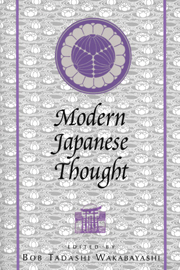1 - Introduction
Published online by Cambridge University Press: 05 June 2012
Summary
Perhaps all developing societies since the Industrial Revolution are fated to undergo Westernization. Japan certainly did. After opening their land under pressure from Perry and Harris in the 1850s, the Japanese adopted Western ways not only in the outer realm of material culture and political forms but also in the inner realm of thought, spirit, and values. Today, Western sociopolitical ideals are so compelling that most Japanese would refuse to live by the pre-1945 imperial ethos. Thus democracy, individual freedom, egalitarianism, pacifism, and the rule of law to uphold basic human rights can be violated only by devious means and over public protest. Yet none of those ideals derived from Japanese or East Asian tradition; all originated in the modern West. Very few present-day Japanese would applaud an act of disembowelment. Fewer still would approve of police torture used to extract confessions. And virtually no one would tolerate a form of slavery whereby a father may sell his daughters into legalized prostitution – while filial piety enjoins them to submit meekly if not cheerfully. However, the Japanese would not have disowned these former folkways without the benefit of Western example, influence, or compulsion. Today, Japanese leftists condemn, and government leaders are obliged to deplore, war crimes and atrocities committed before 1945. But here too, most of those deeds can be deemed “criminal” or “atrocious” only when judged against the ethical standards that Western societies developed. This drastic refashioning of thought and values has not been an easy or straightforward process – many Japanese, often in positions of political authority, have obstructed it.
- Type
- Chapter
- Information
- Modern Japanese Thought , pp. 1 - 29Publisher: Cambridge University PressPrint publication year: 1998
- 5
- Cited by

